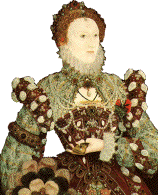September 7: Elizabeth I
Queen Elizabeth I (1533)
It was on this date, September 7, 1533, that the first Queen Elizabeth, monarch of the "Golden Age" of English history, was born at Greenwich Palace. She was a disappointment to her father, King Henry VIII, who desperately wanted a son. Henry had gone so far as to break away from the Catholic Church because the Pope refused him a divorce from Catherine of Aragon. This, Henry believed, would free him to marry a woman who would succeed in giving him a male heir. When that failed, Henry invented charges of incest and adultery and had Anne Boleyn executed. Since the marriage had been mooted, Elizabeth became, legally, a bastard child.
Despite being in limbo regarding the royal succession, Elizabeth was reared with a first-class education. In addition to being a talented student, by adulthood she could speak five languages fluently. But the safety she enjoyed while Henry lived ended with Henry's death in 1547. Elizabeth was 15, and Henry had put her in line for the succession, which made her even more vulnerable to implication in several coup attempts. Only her general popularity spared her from execution.
On 17 November 1558, at age 26, Elizabeth succeeded to the English throne. Having grown up in a time of religious change in England, Elizabeth's own religious opinions were shielded from public view. Writers on the period, both rationalist and religious, admit that skepticism had spread widely by the dawn of the Elizabethan Age. Indeed, contemporary clerical writers spoke sternly about the rise of Atheism.
For example, Sir Walter Raleigh was accused by the Jesuit Robert Parsons of keeping "a School of Atheism," and the Privy Council moved against playwright Christopher Marlowe, identifying him as its chief infidel. As for Elizabeth, she reversed the sober and cautious zeitgeist of earlier years and indulged her appetites for sport (especially riding), music and dancing, pageants and palace parties, and, although not much interested in literature herself, created an atmosphere in which playwrights such as Shakespeare could flourish.
It is plausible that Elizabeth saw the conflict between the Catholic and the Protestant churches as a contest between equals, equally ridiculous. Rather than taking sides, she regarded each with cynicism. Historians cannot claim that she was orthodox in any creed – the Pope excommunicated her in 1570, but she may have seen that as a badge of honor. As one historian put it, "it can hardly be doubted that she was sceptical or indifferent"* to religion. Another writes that, compared to others, "no woman ever lived who was so totally destitute of the sentiment of religion."**
The Elizabethan Court was itself a haven for skepticism, and her persecution of Catholics was instituted only after her policy of toleration was abused by Catholics who plotted against her. Her "virginity" was probably predicated on a healthy skepticism about marriage, as well as concern about having to relinquish power to any husband she chose, but it certainly does not imply religious belief. Elizabeth, like the men around her, was boisterous, vigorous, vulgar, coarse and quite tolerant of the general licentiousness of the age.
Elizabeth was a humane ruler who, by the time she died at Richmond Palace – on 24 March 1603 at age 69, after reigning 44 years – had turned a debtor nation, riven by religion, into one of the most powerful and prosperous countries in the world.
* Albert Frederick Pollard, Political History of England, 1547-1603, 1910, VI, p. 180.
** John Richard Green (a former clergyman), et. al., A Short History of the English People, 1898-99, VIII, p. 83.
Originally published September 2003 by Ronald Bruce Meyer.


